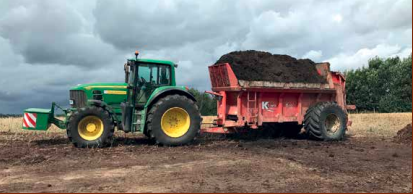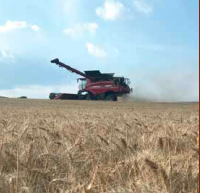“To bale or not to bale”
Life is full of compromises! Any of you who have been married for more than a few years will know this is to be true! I love my wife dearly and without her I’d be completely lost. Not only is she a wonderful woman, mother and cook. She also doubles as farm secretary, go-getter, deliverer of harvest lunches and dinners and the one who knows exactly when I’m doing things wrong! Unfortunately she’s almost always right! Next year we will celebrate our 18 year anniversary and part of the reason we are still happily married is our ability to talk and compromise on things.
“What on earth has this got to do with conservation-ag and no-till farming?” I hear you ask!
Well this year as a farmer who has been 100% no-till farming for 5 yrs I found myself becoming quite set in my ways when it came to the issue of baling straw.

Having spent 2 years travelling the world on my Nuffield Scholarship looking at successful no-till techniques and finding farmers who had been carrying out this practice for up to 40 years, I became a bit of a fanatic about chopping straw, creating a mulch and feeding the worms and soil biology with all forms of crop residue. I have been very proud to say that our lack of P and K applications in bagged form for now over 18 years have been largely down to chopping straw as well as adding some compost, FYM and cover crops in small amounts recently However this year the hot dry spring and summer in the UK saw many more arable farmers than normal bale straw behind the combine!
This was prompted by the stock farmers, who found that summer grazing ran out, and conserved winter supplies had to be fed during summer. The hashtag #farmershelpingfarmers was created on twitter to help champion the plight of the suffering stock farmers and champion the roles of the selfless arable farmers who rushed to the aid of their fellow farmers by baling every blade of straw in sight.
It’s interesting that this coincided with record prices for both straw in the swath and by the ton!! Part of me found this frustrating! “Don’t they know they’re ruining their soils and wrecking their soil organic matter levels?” was the thought going through my head if not on my twitter timeline! It did make my blood boil that certain farmers would publicise their generosity to the nation whilst taking a price for that straw which, if truth be known, the stock farmers will struggle to justify even if they barely can afford!

A soil advisor of mine once said “straw is a crop so treat it as such. Put half the money in your back pocket and spend the other half improving your soils” With this in mind and the arrogance of youth (41 is still young for a farmer!) I obviously chopped everything this year! Having just applied a second dose of slug pellets (ferric phosphate of course) to my struggling Oilseed Rape today (10th September) I’m beginning to wonder whether I should be compromising on my “no baling” rule particularly pre OSR! Perhaps baling the straw and applying some compost/FYM etc would have helped emergence?! (And my bank balance!)
This year we used a cane molasses product with our liquid nitrogen and this seems to have worked well. Our aim has been to soften the negative effects and also reduce our overall N rate. We have done this by 10% on the previous years rate, with yields and quality very pleasing given the difficult grain fill period. I am planning to use this product, called “Boost”, with all fungicides, liquid N and glyphosate at a rate of about 5L/ha for the coming season at @ cost of about £3/ ha per application.
Given the hot and very dry weather following harvest we chose not to establish any cover crops this year. Our self sown volunteer Oilseed Rape is growing away nicely as a free cover crop pre wheat. Ironic that no slug pellets, fertiliser or pre-ems have been used. So thoughts now turn to autumn and next years projects and planned purchases! Having broken 16 shear bolts on our flat lift in as many yards, an auto reset subsoiler and perhaps a big straw shed are on the shopping list!